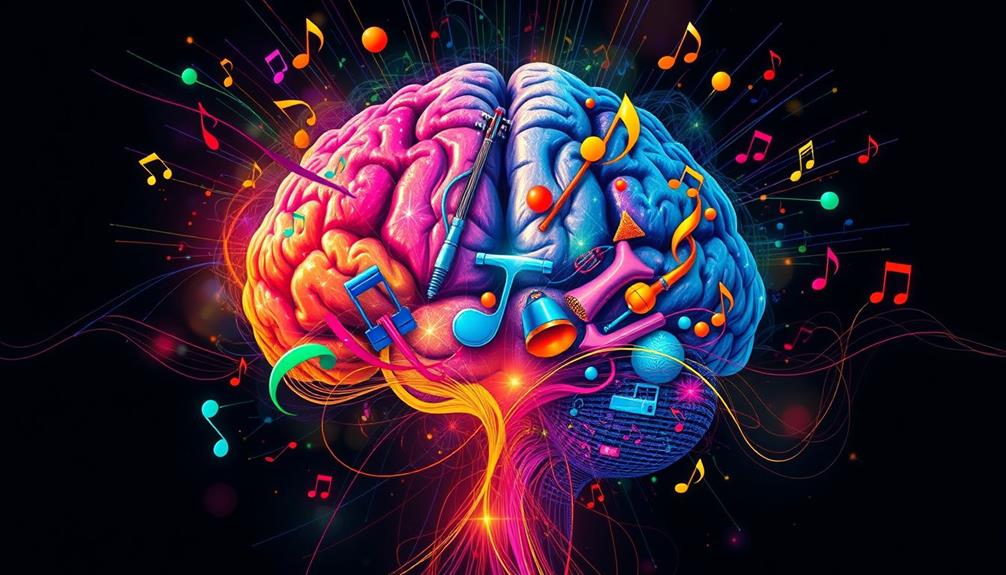Music greatly affects your brain function by influencing emotions, cognition, and memory. As you listen, regions like the amygdala and hippocampus activate, helping process feelings and recollections. Different musical elements evoke various emotional responses; for example, major chords can lift your spirits, while minor chords might bring a sense of sadness. Engaging with music improves cognitive skills, enhances memory, and even promotes emotional well-being through dopamine release. Whether you're enjoying a favorite tune or learning an instrument, music plays an essential role in your brain's performance. There's so much more to uncover about music's impact on your mind. Furthermore, how music impacts emotions can also vary depending on cultural background and personal experiences, making it a deeply individual and universal phenomenon at the same time. Fast tempos and upbeat rhythms might energize and motivate you, whereas slower, softer melodies often promote relaxation and stress relief. The way music is woven into our lives demonstrates its profound ability to connect us with ourselves and others on an emotional level.
Key Takeaways
- Music activates brain regions like the amygdala and hippocampus, crucial for processing emotions and memories.
- Listening to music triggers dopamine release in the nucleus accumbens, promoting pleasure and emotional well-being.
- Musical training enhances cognitive functions, improving memory, attention skills, and problem-solving abilities.
- Familiar music can evoke vivid autobiographical memories, aiding individuals with memory-related conditions like Alzheimer's.
- Engaging with diverse music genres promotes cognitive flexibility and creativity, expanding mental horizons.
Emotional Impact of Music
From the moment you first hear a song that resonates with you, music can evoke profound emotional responses. This happens because music activates key brain regions like the amygdala and hippocampus, which are essential for processing emotions and memories.
Curiously, just as diverse genres of anime movies can elicit strong feelings, the tempo and structure of a song greatly influence your emotions; major chords often bring a sense of happiness, while minor chords can evoke sadness emotional resonance in storytelling.
As you listen, your autonomic nervous system reacts to the emotional cues in the music, causing physiological changes such as variations in heart rate. This connection between music and your body highlights how deeply intertwined your emotional responses are with what you hear.
When a piece of music strikes a chord with you, it can trigger the release of dopamine in the nucleus accumbens, creating feelings of pleasure and emotional well-being.
Your individual preferences for specific genres and songs can amplify these emotional experiences, making them uniquely powerful and tied to your personal memories. In this way, music doesn't just entertain; it profoundly shapes your emotional landscape and connects you to your innermost feelings.
Cognitive Benefits of Music
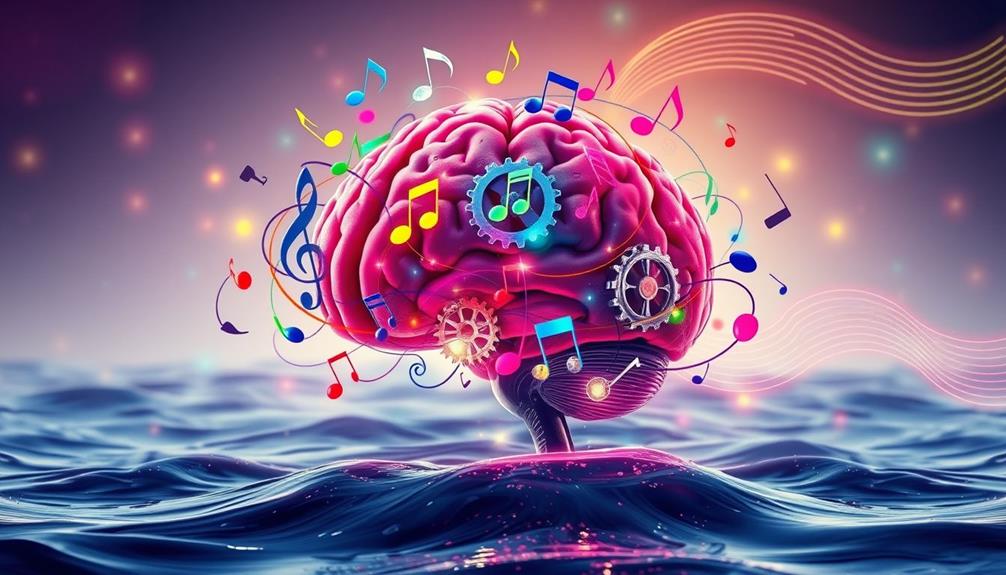
Music's influence extends beyond just emotional experiences; it greatly impacts cognitive functions as well. Engaging with music—whether through listening or playing an instrument—can profoundly enhance your cognitive abilities.
Studies show that individuals with music training often score higher on IQ tests, showcasing improved memory and attention skills. Additionally, AI-generated music is reshaping traditional music creation processes, providing new avenues for cognitive engagement and creativity.
You might also notice that familiar music triggers vivid autobiographical memories, making it a powerful tool for memory enhancement, particularly for folks battling Alzheimer's disease. By actively participating in music activities, you can boost your problem-solving skills and even improve your overall mood, which contributes to a better quality of life.
Moreover, music engagement is linked to better academic performance. It fosters essential skills related to language development and literacy, giving you an edge in learning.
Different genres of music stimulate your brain in various ways, promoting creativity and cognitive flexibility; exposure to new and unfamiliar sounds can further expand your mental horizons.
Neurological Responses to Music
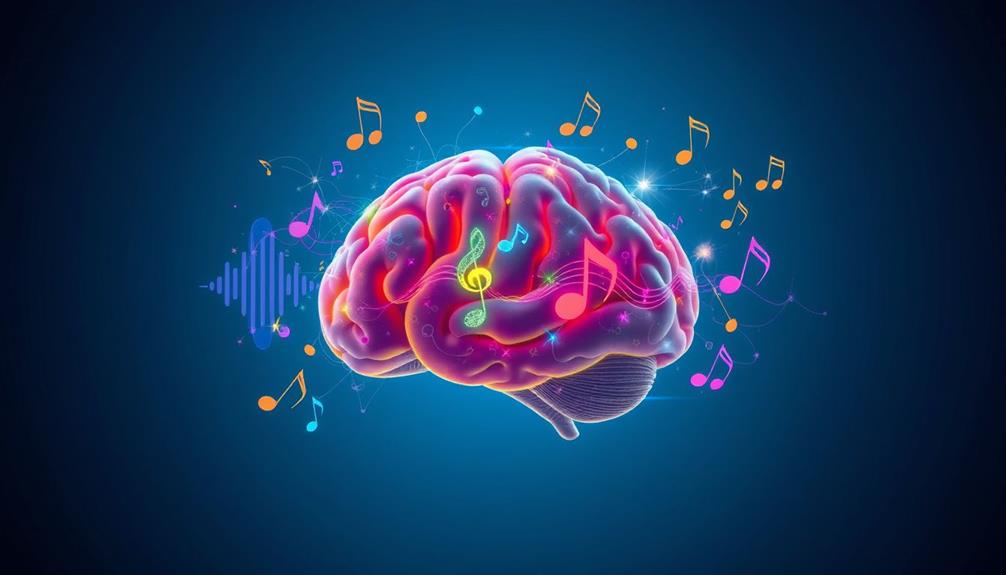
When you listen to music, your brain activates several regions, particularly the hippocampus and amygdala, which play key roles in memory and emotions.
This intricate response highlights how music not only stimulates your auditory senses but also triggers deep emotional reactions.
Additionally, the use of certain essential tools for creating engaging music tracks can enhance your overall experience.
Understanding these neurological responses can shed light on the powerful connection between music and your overall well-being.
Brain Region Activation
Understanding how the brain reacts to music reveals the intricate interplay of various regions responsible for processing sound and emotion. When you listen to music, your temporal lobe kicks into gear, primarily handling auditory information like tone and pitch. Specific gyri within this region are dedicated to these functions, showcasing its essential role in music perception.
As you tap your foot to a rhythm, your cerebellum regulates timing and movement, ensuring your body responds seamlessly to the beat. Additionally, research on AI advancements indicates that AI can enhance our understanding of how music affects brain function by analyzing patterns in neurological responses.
Meanwhile, various components of your brain's reward system, including the nucleus accumbens, activate as you enjoy a favorite tune. This activation leads to an increase in dopamine, linking music listening to feelings of pleasure. Complex musical compositions engage multiple brain regions, highlighting the sophisticated nature of sound perception and musical appreciation.
Although you may experience emotional responses to music, those are processed in areas like the amygdala, while the hippocampus helps connect music to memory. This multifaceted brain activity illustrates how deeply intertwined music is with our cognitive and emotional functions, shaping your overall experience with sound.
Emotional Response Mechanisms
Listening to music can trigger powerful emotional responses through intricate neurological mechanisms. When you enjoy a song, the limbic system comes alive, engaging areas like the amygdala and hippocampus, which are vital for processing emotions and forming memories. This activation often leads to pleasure and reward responses, mainly driven by dopamine release in the nucleus accumbens.
Additionally, music can enhance your curiosity about new experiences, as it often encourages exploration and engagement with diverse sounds and styles.
Your emotional responses to music can vary greatly, influenced by personal preferences and past experiences. For instance, a major chord might evoke joy, while a minor chord could elicit sadness. The tempo also plays a role; faster rhythms tend to make you feel uplifted, while slower ones can bring about a sense of melancholy.
Neuroimaging studies show that the right hemisphere of your brain is mainly involved in processing these emotional components of music. This highlights its important role in shaping your emotional experiences, as it helps you connect with the feelings conveyed by different musical elements.
Music and Memory Enhancement
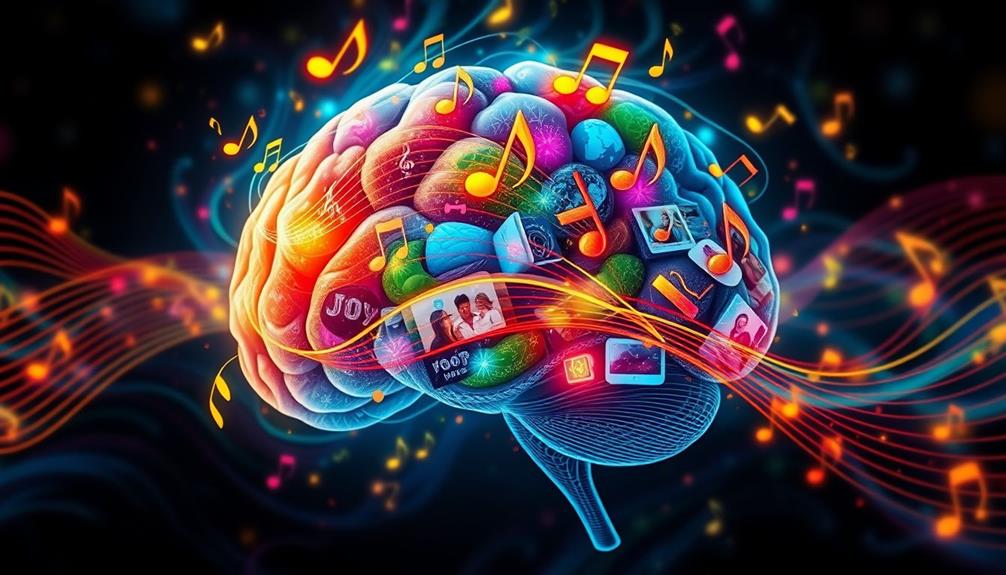
Music has a remarkable ability to enhance memory, often revealing vivid autobiographical memories tied to familiar tunes. When you listen to music, it can trigger specific events from your past, allowing you to recall details with surprising clarity. Research shows that individuals with Alzheimer's benefit markedly from music, as it serves as a mnemonic device that boosts their memory retention.
Moreover, insights into human experience from various art forms illustrate how emotional connections can deepen our understanding of personal memories. The emotional connections you have with music play an essential role in this process. When a song evokes strong feelings, it strengthens your memory retention, making music an effective tool for cognitive enhancement. This emotional resonance creates a powerful link between music and memory in your brain.
Additionally, exposure to music may promote neurogenesis, which is the creation of new neurons in the brain. This process is associated with improved cognitive function and overall brain health. Studies indicate that your personal musical preferences can lead to enhanced brain activity related to memory recall, effectively making music a key player in how you remember and engage with your past.
Therapeutic Applications of Music
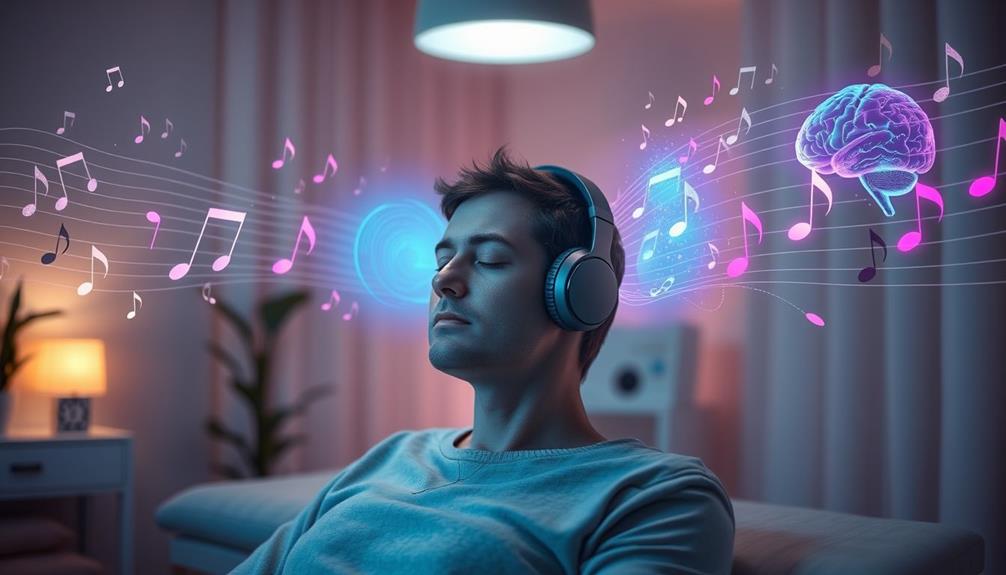
Therapeutic applications of music have gained significant attention in recent years, demonstrating its profound impact on various health conditions. Music therapy has emerged as a powerful tool for addressing neurological issues, with research showing that listening to specific compositions, like Mozart's, can reduce seizure frequency in patients with epilepsy. This highlights music's therapeutic potential in managing such conditions, similar to the way risk management tactics are employed in financial planning.
Moreover, music therapy has proven effective for patients with Parkinson's disease and depression, offering emotional and cognitive benefits that enhance their quality of life. By identifying music that elicits positive cognitive responses, therapists can create personalized treatment plans tailored to individual needs. This makes music therapy a unique approach to healthcare.
Ongoing research into music's impact on brain function continues to explore innovative therapies, emphasizing its role in precision medicine.
It's essential to recognize that the benefits of music therapy extend beyond patients; healthy individuals also experience improved well-being through music engagement. Essentially, whether you're facing health challenges or simply seeking to enhance your emotional state, music therapy provides a versatile and impactful avenue for healing and growth.
Music's Role in Creativity
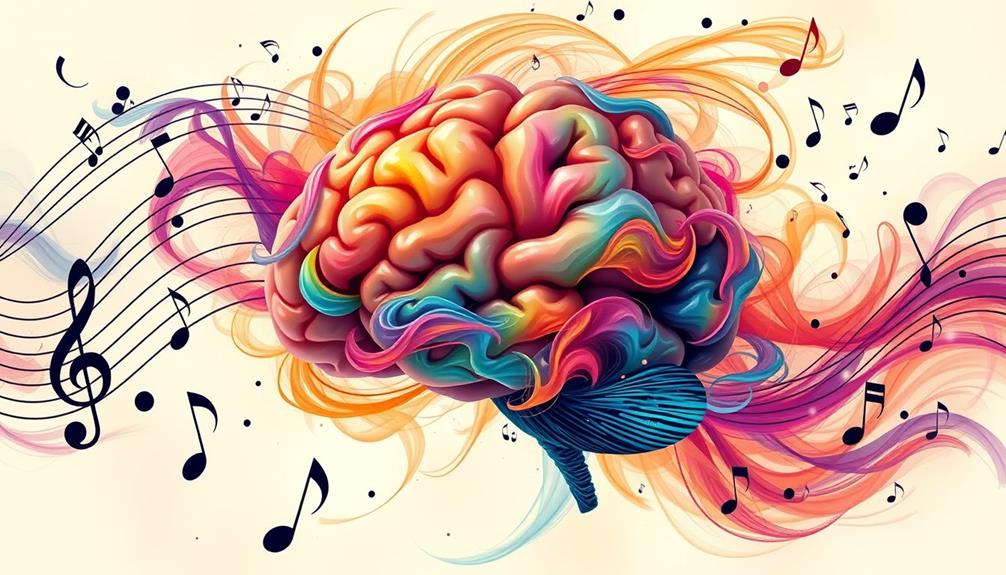
Music plays an essential role in enhancing your creative thinking by exposing you to diverse sounds and emotional expressions.
For instance, artists like Avi Kaplan's recent creative ventures showcase the power of collaboration in music to inspire new ideas. Engaging with new genres can spark innovative ideas and even trigger memories that fuel your imagination.
Whether you're learning an instrument or simply listening, the therapeutic effects of music can greatly boost your creativity.
Enhancing Creative Thinking
Often, listening to a variety of music genres can spark your creativity and encourage innovative thinking. Research shows that music activates different neural circuits in your brain, enhancing creative thinking and cognitive flexibility.
Engaging with unfamiliar sounds can feel uncomfortable at first, but it promotes brain engagement and improves problem-solving abilities. Additionally, studies suggest that certain zodiac signs are viewed as more appealing socially, which can indirectly influence creative collaboration in group settings.
Here are some ways music can enhance your creative process:
- Diverse Genres: Explore new styles to challenge your brain and ignite fresh ideas.
- Active Participation: Learn an instrument or compose, boosting collaboration and teamwork skills.
- Cognitive Benefits: Incorporating varied music into your daily routine enhances overall brain function.
- Mood Improvement: Music can elevate your mood, which positively impacts creative expression.
- Imagination Activation: Exposure to different musical pathways stimulates your imagination, leading to innovative solutions.
Music and Emotional Expression
Creative thinking isn't just about generating ideas; it's also about how you express your emotions. Music plays an essential role in this emotional expression, allowing you to connect deeply with your feelings. When you listen to music, you tap into its ability to evoke strong emotional responses. Major chords often bring happiness, while minor chords can evoke sadness, reflecting universal emotional experiences.
Engaging with music can also enhance your overall well-being, making it a valuable tool in a healthy lifestyle.
Your ability to perceive and respond to music enhances your creativity, as different tempos can influence your emotional state. Faster rhythms might uplift your mood, while slower tempos can inspire introspection. By exploring diverse sounds and styles through listening to music, you stimulate brain engagement and encourage cognitive flexibility, essential for creative thought.
Moreover, the emotional connections you form with specific songs can trigger vivid autobiographical memories. This connection strengthens the impact of your personal experiences, enriching your creative expression.
For those facing mood disorders, music therapy can even improve emotional regulation, showcasing music's powerful role in fostering emotional expression. So, the next time you listen, remember that music isn't just sound; it's a gateway to your emotions and creativity.
Therapeutic Effects on Creativity
Numerous studies show that engaging with music can greatly boost your creativity by enhancing cognitive functions and problem-solving skills. Whether you're playing an instrument or simply listening, music stimulates your brain in remarkable ways.
Here are some key benefits of music on creativity:
- Improved problem-solving abilities: Musical training sharpens your analytical skills.
- Enhanced cognitive functions: Your attention and memory improve through regular engagement with music.
- Diverse sound exposure: Exploring various genres challenges your brain and fosters cognitive flexibility.
- Emotional responses: Familiar songs can trigger memories that inspire your artistic expression.
- Brain connectivity: Musical training strengthens connections in your brain, leading to innovative thinking.
When you listen to unfamiliar music, it might feel uncomfortable at first, but this discomfort is a sign of your brain actively engaging and exploring new ideas.
Over time, these experiences can lead to greater cognitive resilience and creative outcomes.
Evolutionary Perspective on Music
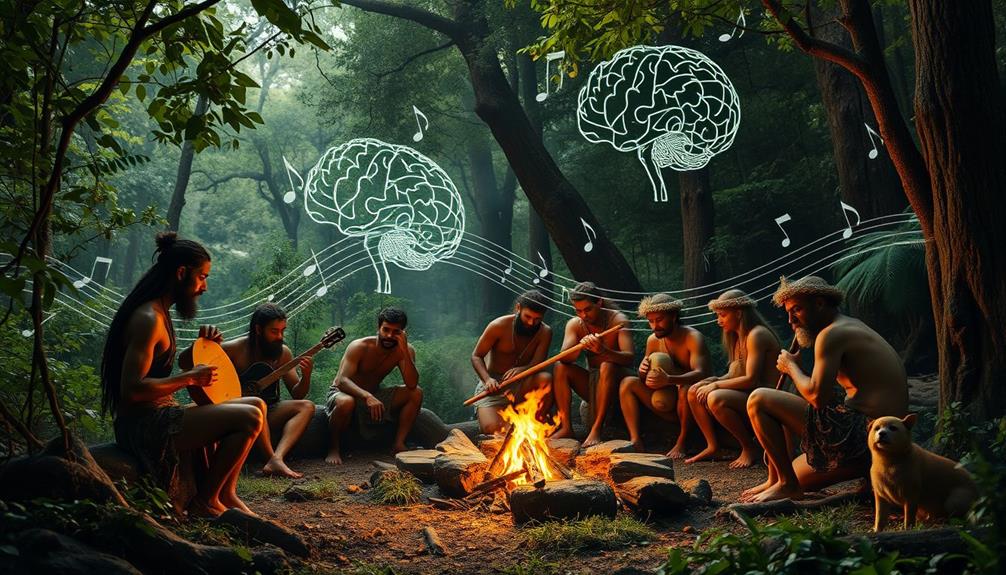
How did music become such an integral part of human culture? Music likely evolved from primitive vocalizations, serving as a crucial emotional expression long before words were even formed. This connection highlights how deeply ingrained music is in our social fabric.
The evolution of the mammalian middle ear has also played a significant role. It enhances our ability to perceive complex musical sounds, shaping our cognitive functions and enriching social interactions. Moreover, universal features of music and dance emerged early in human development, showcasing their importance in fostering social bonds.
Here's a quick overview of the evolutionary aspects of music:
| Aspect | Description | Impact on Society |
|---|---|---|
| Primitive Origins | Evolved from vocalizations | Key form of emotional expression |
| Middle Ear Evolution | Enhances sound perception | Fundamental to music appreciation |
| Social Bonding | Music and dance as social connectors | Strengthens community ties |
| Brain Function | Right hemisphere processes musical elements | Influences cognitive development |
| Universal Features | Common traits across cultures | Promotes shared experiences |
Future Research Directions
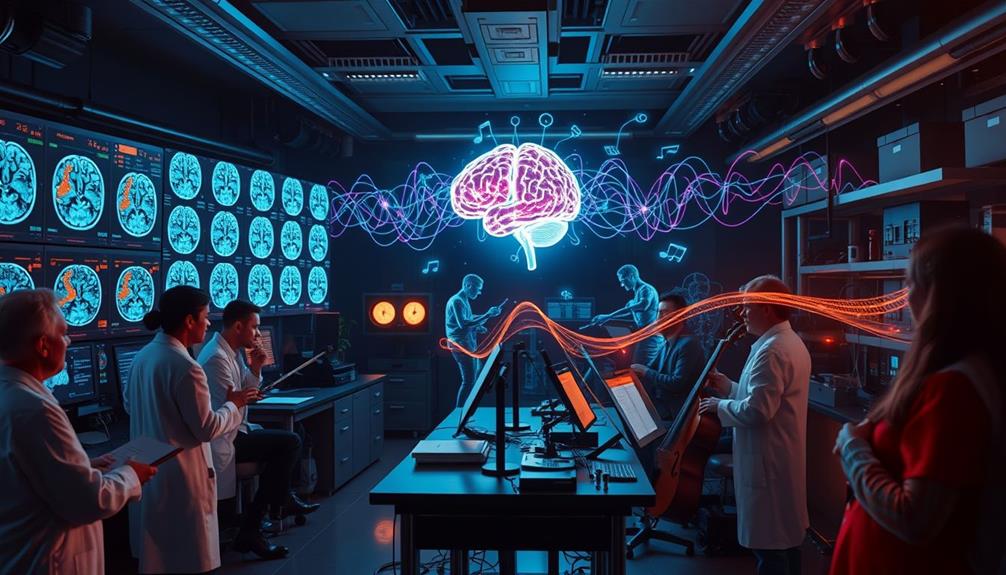
As researchers explore deeper into the interplay between music and the brain, a unified model of the neural mechanisms behind music perception is on the horizon. This future research is pivotal in enhancing our understanding of how music impacts brain function and could revolutionize therapeutic applications.
Here are some key directions for upcoming studies:
- Collaboration Across Disciplines: Bringing together scientists from neuroscience, psychology, and musicology to foster innovative insights.
- Emotional Responses: Investigating how individual differences influence emotional reactions to music, offering a personalized approach to therapy.
- Brain Adaptability: Exploring the brain's ability to adapt and recover through musical engagement, particularly in rehabilitation settings.
- Therapeutic Applications: Examining the use of music therapy in treating mental health conditions and neurodegenerative diseases.
- Neural Mechanisms: Identifying specific brain regions involved in music perception to create a thorough understanding of its effects.
These research avenues not only promise to deepen our knowledge of music and the brain but also hold the potential to transform therapeutic strategies, harnessing music's power for healing and well-being.
Music and Physical Well-being

The relationship between music and physical well-being reveals powerful benefits that extend beyond emotional health. Listening to music can lower your blood pressure and heart rate, greatly contributing to overall cardiovascular health and reducing stress levels.
By incorporating music therapy into your routine, you can alleviate symptoms of depression and anxiety, promoting both emotional resilience and mental health.
Upbeat music has the added benefit of elevating serotonin levels, which enhances your mood and encourages positive emotional states. If you're concerned about motor coordination, rhythmic music can be particularly effective. It aids in improving timing and coordination, making it a valuable tool for those with movement disorders like Parkinson's disease.
Moreover, engaging with music—whether you're listening or playing an instrument—has been linked to enhanced cognitive functioning, especially in older adults.
It can improve your quality of life by keeping your mind sharp and your spirits high. Essentially, music isn't just an art form; it's a crucial component of physical well-being that you can easily incorporate into your daily life for considerable health benefits.
Frequently Asked Questions
How Does Music Affect Brain Function?
Music captivates your brain, engaging various regions that enhance memory, boost mood, and reduce stress. When you listen or play, you stimulate cognitive functions, improving focus and emotional responses, ultimately enriching your overall mental well-being.
What Have Psychologists Discovered About the Effects of Music on People?
Imagine a painter with a vibrant palette; psychologists've discovered that music colors your emotions and thoughts, enhancing memories, lifting spirits, and even healing wounds. It transforms your inner world, connecting you to deeper feelings and experiences.
How Do Music Frequencies Affect the Brain?
Music frequencies directly influence your brain by altering brainwave patterns. Lower frequencies promote relaxation, while higher ones enhance alertness. Specific sounds can even affect your heart rate, helping you feel calmer or more focused.
What Are 10 Benefits of Listening to Music?
Listening to music boosts your mood, enhances memory, reduces stress, improves focus, increases productivity, stimulates creativity, aids relaxation, strengthens social connections, boosts physical performance, and evokes powerful emotions, enriching your daily experiences greatly.
Conclusion
To sum up, music profoundly impacts your brain, enhancing emotions, cognition, and even memory. Did you know that listening to music can increase your productivity by up to 15%? This fascinating statistic highlights just how powerful music can be in your daily life. As research continues to explore its many dimensions, you'll likely discover even more ways music can enrich your well-being and creativity. So, go ahead—turn up your favorite tunes and let the magic unfold!

